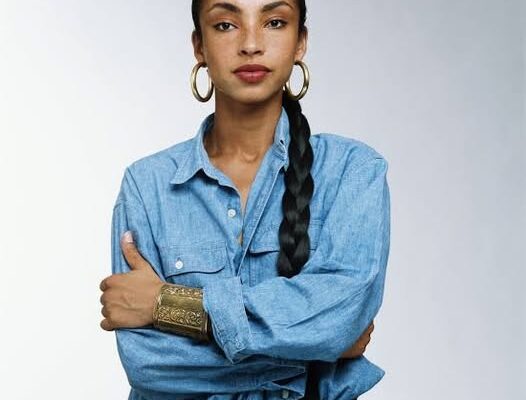Why It’s Time to Honor Us: The Real Story of Sade Adu, Nigeria, and the Grammy.
In all the grand tapestries of musical history, certain threads shimmer more brightly, woven with a resonance that transcends time and geography. One such gleaming thread belongs to Helen Folasade Adu—Sade Adu—whose life and career embody both the whispered elegance of soul and the thunderous pride of Nigerian identity. Born on January 16, 1959, in Ibadan, Oyo State, Nigeria, Sade’s name—Folasade, meaning “honor confers a crown” in Yoruba—felt almost fated, as if purpose had preordained her. Her father, a Nigerian lecturer in economics, and her English mother, a district nurse, separated when Sade was four. Her mother returned to England with her and her older brother, but the resonance of her birth land remained, an ever-present harmony behind her voice.
Sade grew up in Essex, under the wing of her maternal grandparents until moving with her mother and brother to Holland-on-Sea. Her teenage years led her back to London to study fashion design at Saint Martin’s School of Art—a path that, in itself, would inform her aesthetic: sleek, restrained, eternally chic. But fashion was only the outward styling; inside her, music had already taken root, waiting to unfurl
When she began singing with the British band Pride, she met guitarist and saxophonist Stuart Matthewman. The pair formed a songwriting partnership, and by 1983 Sade’s eponymous band—her voice in the lead—was signed by Epic Records. In 1984, the debut album Diamond Life arrived like an elegant whisper but with seismic impact. Powered by tracks like “Your Love Is King” and the iconic “Smooth Operator,” it became one of the era’s best‑selling albums and the best debut ever by a British female vocalist. That win wasn’t a trophy—it was a statement, a quiet storm of brilliance that declared a Nigerian-born singer could reshape global pop narratives.
In 1986, at just 27, Sade became the first Nigerian-born artist to win a Grammy Award, securing the Best New Artist accolade at the 29th Grammys. She could not attend the ceremony; Billy Crystal and Whoopi Goldberg accepted on her behalf—apt symbols for an artist whose presence has always been measured, intentional, and ineffably powerful.
That moment in 1986 was more than personal triumph; it echoed across borders and cultures. For Nigeria, then, the Grammy belonged not just to Sade, but to a nation yearning for recognition on the world’s stage. Yet, as decades passed, Nigeria continued to chase Grammy wins like elusive gold at dusk. King Sunny Adé’s Synchro System was nominated in 1984 but didn’t win; Babatunde Olatunji finally clinched a Grammy in 1991—but as a featured act on Mickey Hart’s Planet Drum, not for representing Nigeria solo.
Despite her diplomatic distance from flashbulbs and headlines, Sade’s style and artistry deeply shaped the cultural lexicon. Rolling Stone’s early portraits of her note her sleek ponytail, red lip, and minimalist wardrobe as visual whispers that spoke volumes—model-off-duty chic, decades before it became mainstream. Her voice—a contralto with hints of ache, dignified grace, and husky restraint—defied easy categorization yet connected universally. Critics hailed her songwriting as “soulful and jazzy yet poppy, funky yet easy listening,” a lush tapestry of sound that resonated across genres.
Sade’s influence rippled through the worlds of R&B, hip-hop, and contemporary music. Rakim recalled growing up enveloped in her music; Talib Kweli credited her precision for his own; Missy Elliott names “Smooth Operator” a favorite. Kanye West called the return of Sade’s voice in Soldier of Love “better than everything else,” and Rick Ross spoke of a lifelong infatuation. Aaliyah and Brandy cited her as an influence; even artists from metal, like Chino Moreno and Greg Puciato, recognized her mystique
Her accolades continued: Best R&B Performance by a Duo or Group for “No Ordinary Love,” Best Pop Vocal Album for Lovers Rock in 2002, and Best R&B Performance for “Soldier of Love” in 2011. She was appointed OBE in 2002 and elevated to CBE in 2017 And yet, she remains elusive, tracked more through her artistry than appearances.
Over the years, many Nigerian artists followed in her footsteps, winning or being nominated for Grammys: Babatunde Olatunji, Sikiru Adepoju, Burna Boy, Wizkid, Tems, Davido, Asake, Tiwa Savage—and beyond, Seductive successes rooted in Nigeria, now shining on global altars. Burna Boy’s Twice as Tall earned him the first Grammy solo win by an artist who made music as and from Nigeria in 2021. Wizkid earned one for “Brown Skin Girl,” Tems won for “Wait for U” in 2023 and again for “Love Me Jeje” in 2025. Some, such as Femi Kuti and Seun Kuti, have earned multiple nominations yet still await that crowning honor.
But amid all these milestones, Sade’s legacy remains foundational. She didn’t just win Grammys; she quietly erased borders in sound. At a time when African music was relegated to “World Music,” she claimed her place in soul, jazz, pop—but always with the depth of heritage. In the growing movement to honor Afrobeats and African music more respectfully—now with Grammy categories named Global Music and Global Music Performance—still, we return to that moment in 1986, when Sade carried the weight of expectation and transformed it into possibility
Now, conjure this story more personally: imagine how it resonates for a generation of Nigerian youth, of musicians, of dreamers. She didn’t perform in local venues or thrive on viral hype; she crafted her artistry with disciplined subtlety. But she opened the door. Her whispers taught artists to demand global respect without screaming. Her success carved a path for Beyoncé, Drake, and others who cite her influence openly today.
It is time to honor not just Sade. It is time to honor us—the collective legacy of Nigeria, of African artistry, of those whose stories started before the blinking lights of Western stages, but who now shape those stages from inside. When Sade won Best New Artist in 1986, she became the face of possibility. In the decades since, Nigeria’s artists have built that possibility into a movement. Burna Boy’s global fusion, Tems’s evocative lyricism, Wizkid’s cross-continental melodies, Davido’s Afrobeats anthems—they all stand on shoulders that quietly bore the crown: Folasade. The crown her name bestowed.
So the real story isn’t only that Sade Adu was the first Nigerian-born Grammy winner—it’s that she embodied a truth: that excellence can arrive through restraint; that honoring one’s roots doesn’t require leaving them behind; that the quietest voices can echo across continents. It’s time to honor Sade, yes—but also time to honor the full chorus she began, the generations she inspired, and the nation she continues to elevate with every soulful note.
If this 2000‑word homage still feels too brief to capture the nuance, I’d be happy to expand any part—her early life, the cultural impact, the ripple across Nigerian music—or weave in direct quotes, lyrical analysis, or fan reflections. Let me know!



